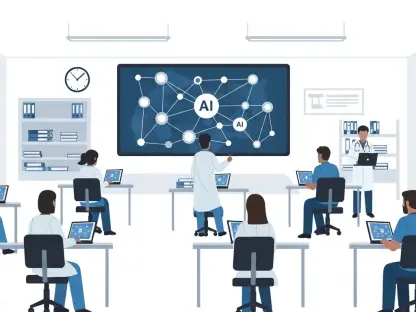Introduction to a New Era in Healthcare
In an era where technology reshapes industries at an unprecedented pace, healthcare stands at a transformative crossroads with generative AI (genAI) leading the charge, and a staggering 44% of healthcare executives have already integrated AI agents into production environments, signaling a profound shift in how medical institutions operate and deliver care. This rapid adoption underscores a pivotal moment for the sector, where innovation is not just an option but a necessity to meet rising demands for efficiency and improved patient outcomes. The integration of genAI is redefining operational frameworks, promising substantial returns on investment while tackling complex challenges in patient care.
The healthcare industry today is navigating a landscape marked by technological breakthroughs and evolving priorities. From streamlining administrative tasks to enhancing clinical decision-making, genAI is becoming a cornerstone of strategic planning. Key players such as Google Cloud and Hackensack Meridian Health are driving this change, setting benchmarks for how AI can elevate both operational efficiency and patient satisfaction. This report delves into the current state of genAI in healthcare, exploring its impact, challenges, and future potential.
The Current Landscape of Generative AI in Healthcare
The healthcare sector is witnessing a seismic shift as genAI becomes embedded in core operations, reshaping how organizations function on multiple levels. This technology is not merely a tool but a catalyst for systemic change, enabling hospitals and clinics to optimize workflows and enhance service delivery. The significance of genAI lies in its ability to process vast amounts of data swiftly, offering insights that were previously unattainable with traditional methods.
Major industry leaders, including Google Cloud and Hackensack Meridian Health, are at the forefront of this revolution, showcasing practical applications that range from clinical data summarization to inventory management. Industry roundtables have played a crucial role in fostering dialogue, bringing together experts to discuss best practices and share success stories. These collaborative efforts highlight a collective commitment to leveraging AI for better healthcare outcomes.
The technological influence of genAI extends beyond mere automation, impacting patient care through personalized solutions and improved diagnostic accuracy. Operationally, it drives efficiency by reducing manual workloads and enabling staff to focus on critical tasks. As adoption accelerates, the industry is beginning to see measurable improvements in both cost management and care quality, setting a strong foundation for future advancements.
Key Trends and Market Insights in Healthcare AI
Emerging Trends and Strategic Priorities
The adoption of genAI in healthcare is shaped by several dominant trends that reflect the industry’s evolving needs. Operational efficiency tops the list, with 54% of executives prioritizing streamlined processes, closely followed by employee productivity at 52% and patient experience enhancement at 51%. These priorities indicate a clear focus on using AI to address immediate operational bottlenecks while improving overall service quality.
Beyond these core areas, strategic decision-making is gaining traction, with 41% of leaders recognizing genAI’s potential to inform critical choices. There is also a growing emphasis on accelerated innovation, as organizations aim to develop new products and maintain market competitiveness. Over the next two to three years, diverse business objectives are expected to emerge, ranging from expanding AI agent deployment to pioneering novel healthcare solutions.
These trends underscore a broader shift toward integrating genAI as a strategic asset rather than a mere operational tool. The focus on varied goals reflects an understanding that AI can drive value across multiple dimensions, from internal efficiencies to external market positioning. This multifaceted approach is poised to redefine how healthcare organizations plan for long-term growth.
Market Data and Future Projections
Current data reveals a robust adoption rate, with 34% of healthcare organizations deploying over 10 AI agents in their operations. This widespread integration highlights the technology’s transition from experimental phases to practical, everyday use. Additionally, 74% of executives report increased spending on genAI, demonstrating a strong financial commitment to scaling these solutions.
Looking ahead, budget allocations are set to tilt heavily toward genAI, with 46% of leaders planning to dedicate over 50% of their AI budgets to this area. Non-AI budgets are also being redirected, with 48% of funds earmarked for genAI initiatives this year, signaling confidence in the technology’s cost-effectiveness and impact. These figures suggest a sustained investment trend that will likely fuel further innovation.
Projections indicate that as costs associated with genAI implementation continue to stabilize, more organizations will ramp up deployment. This financial optimism is matched by a strategic intent to embed AI deeper into core functions, ensuring that healthcare systems remain agile and responsive to emerging challenges. The data paints a picture of an industry ready to embrace AI as a long-term driver of transformation.
Challenges in Adopting Generative AI in Healthcare
Adopting genAI in healthcare is not without significant hurdles, with data privacy and security emerging as paramount concerns. When evaluating large language model providers, executives consistently cite the risk of data breaches and unauthorized access as critical barriers. These issues are compounded by the sensitive nature of patient information, necessitating stringent safeguards.
Ethical implementation adds another layer of complexity, as organizations grapple with ensuring that AI systems operate transparently and fairly. The potential for bias in algorithms or misuse of technology raises questions about responsible deployment. Addressing these concerns requires a delicate balance between innovation and accountability, with a clear need for frameworks that prioritize patient trust.
To overcome these challenges, robust security measures must be paired with cautious scaling of AI solutions. Developing comprehensive policies for data handling and investing in secure infrastructure can mitigate risks. Additionally, fostering a culture of ethical AI use through training and oversight will be essential to navigate this intricate landscape, ensuring that advancements do not come at the expense of integrity.
Regulatory and Ethical Considerations for AI in Healthcare
The regulatory environment surrounding genAI in healthcare is intricate, with strict guidelines shaping how technology is deployed. Compliance with data protection standards, such as those governing patient confidentiality, is non-negotiable for organizations seeking to integrate AI. These regulations influence everything from system design to data storage, requiring meticulous attention to legal requirements.
Ethical considerations are equally critical, as the industry must uphold principles of fairness and transparency in AI applications. The potential impact on patient rights and care quality demands that ethical guidelines be embedded into technology development. This dual focus on regulation and ethics ensures that trust remains a cornerstone of AI adoption, safeguarding both providers and patients.
Security plays a pivotal role in maintaining this trust, as breaches can erode confidence in digital solutions. Regulatory bodies are increasingly emphasizing the need for secure systems, pushing organizations to prioritize cybersecurity alongside innovation. As the landscape evolves, staying ahead of regulatory changes will be vital for healthcare entities aiming to leverage genAI responsibly.
Future Outlook for Generative AI in Healthcare
The trajectory of genAI in healthcare points toward a future rich with emerging applications and potential market disruptors. Innovations such as AI-driven personalized medicine and predictive analytics are set to redefine care delivery, offering tailored solutions to complex medical challenges. These advancements promise to enhance precision in treatment while opening new avenues for research.
Cost reductions and shifting consumer expectations are expected to further shape growth areas, as patients demand more accessible and efficient services. The ability of genAI to lower operational expenses while meeting these demands positions it as a key enabler of scalability. Additionally, global economic conditions will influence investment patterns, potentially accelerating or constraining AI integration based on funding availability.
Regulatory changes will also play a significant role in determining the pace of adoption, as evolving policies could either facilitate or hinder progress. Keeping abreast of these dynamics will be crucial for stakeholders aiming to capitalize on genAI’s potential. The coming years are likely to witness a deeper fusion of technology and healthcare, driven by a commitment to innovation and adaptability.
Reflecting on Findings and Future Steps
Looking back, the exploration of genAI in healthcare revealed a landscape marked by rapid adoption and transformative potential. Discussions highlighted how 44% of executives had integrated AI agents into production, reflecting a strong industry consensus on the technology’s value. The dual focus on operational efficiency and patient care improvement emerged as a defining theme, shaping strategic priorities.
Reflecting on challenges, data privacy and security stood out as critical areas that demanded attention. The commitment to ethical deployment was evident, as leaders sought to balance innovation with responsibility. These insights underscored the importance of robust frameworks to support sustainable AI growth in the sector.
Moving forward, healthcare leaders should focus on actionable strategies, such as investing in advanced security protocols and fostering cross-industry collaboration to address regulatory hurdles. Prioritizing continuous education on ethical AI use can further ensure responsible scaling. As the industry advances, building partnerships with technology providers and policymakers will be essential to navigate complexities and unlock genAI’s full potential for transformative care.









